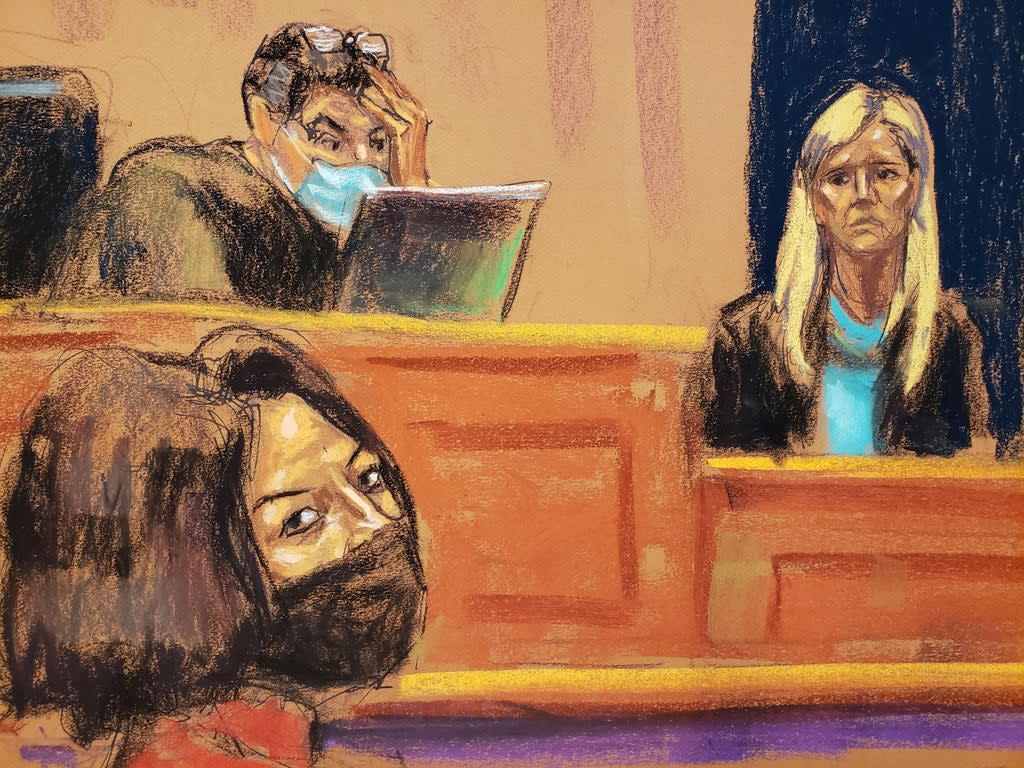Voices: Ghislaine Maxwell and what research tells us about women accused of sexual abuse

As the trial of Ghislaine Maxwell continues for her alleged role in the sexual abuse and trafficking of young girls with Jeffrey Epstein, questions arise about the nature and prevalence of female sexual abusers. It’s something I have addressed a number of times in my research.
Crime statistics show that the majority of sexual abusers are male. Yet national surveys of victimization show rates of female perpetration are six to ten times higher than reports to law enforcement would indicate. Arrest and conviction rates likely underrepresent the number of female sex offenders, because those who have been assaulted by a woman are less likely to report the abuse, and when abuse is reported, women less likely to be arrested and convicted.
When women are accused of sexual offenses, they are frequently accused of participating in abuse with a male co-offender, like the case involving Maxwell and Epstein. Indeed, it is estimated that 40 percent of women accused of sexual abuse did so with a co-offender. Women may be involved by recruiting victims into abusive situations. This can occur though manipulation or coercion, or by grooming the victims by providing a sense of safety. Female offenders may also participate in sexually abusing victims in front of, or at the same time as, the male abuser, or watching the abuse. Ghislaine Maxwell is accused of all of these.
Women who perpetrate with a co-offender differ from female solo-offenders and male offenders in several ways. Many report traumatic childhoods or experiencing violence in childhood or in adult relationships. In many cases, they are in abusive relationships with their co-offender, commonly reporting being coerced, manipulated, or physically harmed to force participation in the abuse. It’s important to note, though, that Maxwell has not claimed victimization in her defense or the previous defamation case.
Maxwell’s defense has claimed another kind of victimization — victimization by the system and society. In opening arguments, Maxwell’s lead defense lawyer, Bobbi Sternheim, stated, “Ever since Eve was accused of tempting Adam for the apple, women have been blamed for the bad behavior of men and women are often villainized and punished more than the men ever are.” This statement alludes to speculation by some that the charges against Maxwell are being pursued as a proxy for Jeffrey Epstein, who could not be tried due to his death.
In some sense, this may be true. Former federal prosecutor in Brooklyn, Moira Oenza, summarized it well when she said, “The shadow of Epstein is going to loom large here.” Many have taken the statements from survivors of Epstein’s alleged abuse to prosecutors to “finish what you started” as meaning that someone — anyone — needs to be held accountable. The defense capitalizes on the idea that Maxwell may be being used as a scapegoat, with Maxwell’s attorney Bobbi Sternheim saying, “The charges against Ghislaine Maxwell are for things that Jeffrey Epstein did. But she is not Jeffrey Epstein. She is not like Jeffrey Epstein, and she is not like any of the other men — powerful men, moguls, media giants — who abuse women.”
But Maxwell, accused of grooming, trafficking, and abusing young girls, has taken the same defense strategy as so many other powerful men in similar cases. Her defense seeks to discredit the victims, accusing them at best of faulty memories, and at worst of fabricating stories for publicity or financial benefit. They have attempted to shame the accusers based on histories of substance use and their hesitance to report when the abuse first appeared.
The statement “the charges against Ghislaine Maxwell are for things that Jeffrey Epstein did” also denies any harm or impact of Maxwell’s alleged actions. Survivors victimized by women face many of the same traumatic effects of those abused by men. In addition, there is the added betrayal of a woman who befriended them, made them feel safe, and then coerced or forced them to be abused.
When women perpetrate sexual offenses, it is most often against someone they are expected to care for, usually when they are acting as a teacher or a babysitter. This betrayal further erodes a survivor’s ability to feel safe or trust their own judgement, contributing to an inability to build friendships or romantic relationships as adults, anxiety and depression, self-harming behaviors, and substance abuse.
Despite assertions that there is no reason to pursue these abuse cases following Epstein’s death, the cases do not end just because the alleged ringleader cannot be convicted. Former US Attorney General Bill Barr said, “Any co-conspirators should not rest easy. The victims deserve justice and they will get it.” Many others, including the “powerful men, moguls, media giants” Sternheim spoke of have yet to be charged or tried for their alleged abuses in connection with this case. One survivor urged prosecutors to continue pursuing charges against those that helped Epstein, insisting, “We are survivors, and the pursuit of justice should not abate.”
Poco Kernsmith is a professor at Wayne State University in Michigan whose primary research includes sexual violence prevention
Read More
I represented 8 Epstein victims. At Maxwell’s trial, I admired this legal tactic
Ghislaine Maxwell’s trial brought back a phrase we should never use again
Ghislaine Maxwell’s trial feels disturbingly familiar | Clémence Michallon

 Yahoo News
Yahoo News 
